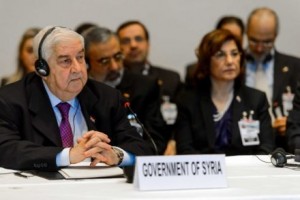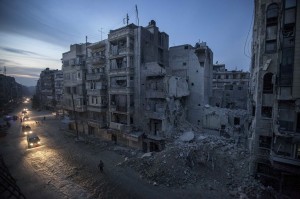As international delegates arrived in Geneva, Switzerland on Tuesday, January 21, doubts persisted concerning whether they would be able to bring an end to Syria’s three-year-old civil war.

radioaustralia.net.au
Sponsored by the United States, Russia, and the United Nations, the peace accords, known as “Geneva 2,” will bring together officials from Syrian president Bashar al-Assad’s government along with the Syrian National Council (SNC) an opposition bloc consisting of various groups seeking to overthrow the Assad regime. However, numerous groups engaged in the conflict have refused to attend, including many Islamist fighters who seek to turn Syria into an Islamic emirate. Complications further expanded as UN Secretary General Ban Ki-Moon, under the lobbying influence of U.S. Secretary of State John Kerry, withdrew an invitation to Iran, one of Assad’s main financial and materials supporters.
According to Reuters, Ban faced immense pressure from both Washington and the SNC, the latter threatening to boycott the talks and further obstruct any chances of conflict resolution. Moreover, Iran rejected the caveat that it had to accept the guidelines of a previous peace conference held in Geneva in 2012 that called for President Assad to step down and allow a transitional administration to take over. These peace talks failed after the U.S. and Russia could not agree on Assad’s post-conflict, political role. Washington Post reports that Russian Foreign Minister Sergei Lavrov said excluding Iran is not a “catastrophe,” and said Russia and the other countries at the conference will still push for a productive dialogue between the warring factions.
Further complications arising as peace talks begin include the revelation of widespread torture and systematic killing committed by the Assad régime against 11,000 detainees in Syrian government custody. Al-Jazeera reports that thousands of photographs smuggled out of Syria and examined by a team of war crimes prosecutors and forensic experts show emaciated bodies marked with signs of brutal beatings, strangulation, and other forms of torture. The photographs were taken by a photographer for the military police who had secretly defected to the opposition. While both sides of Syria’s civil war have been accused of war crimes, this evidence is the most definitive proof of large-scale killing on the part of the régime to date. According to U.S State Department spokeswoman Marie Harf, one reason “Geneva 2” needs to be fruitful is because “the situation on the ground is so horrific that we need to get a political transition in place and…we need to get the Assad régime out of power.” Reuters reports that the former chief prosecutor of a war crimes tribunal for Sierra Leone, Desmond de Silva, commented that “some of the images we saw were absolutely reminiscent of people who came out of Belsen and Auschwitz.” It is not yet known how the revelations of these photographs will influence the demands of other negotiators, such as Russia, or the SNC.
Meanwhile, as “Geneva 2” begins, warfare continues in Syria. It is estimated that 130,000 people have died along with 22 million being displaced. Spillover from the conflict has also affected neighboring countries. In Lebanon’s capital, Beirut, a suicide bombing occurred in front of the headquarters of Hezbollah, a Shi’a group that actively assists Assad and militarily adheres to the Alawite offshoot of Shi’a Islam. Meanwhile, Iraq faces political strife as al-Qaeda-linked groups seek greater influence amongst the country’s Sunni population. Currently, Iraqi government forces and tribal fighters are trying to expel al-Qaeda fighters, staunchly opposed to Iraq’s Shi’a-dominated government, from the Sunni enclave in the country’s west. Consequently, as the conflict between Sunni-backed rebels in Syria and the Alawite-majority government continues, sectarian divides deepen further throughout the Middle East.

